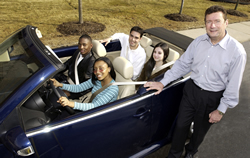 |
| Frank
Maguire, vice president of sales and marketing for Volkswagen of America (far
right) stands with young drivers demonstrating proper safety belt usage. |
Peer
pressure, lack of comfort and a feeling of invincibility are the leading reasons
American teenagers cite for their tendency towards non-use of safety belts, according
to a just-released nationwide polling of high school students conducted by Volkswagen
of America, Inc. Another top reason given by teens was the belief that seat belts
are not necessary for short trips from home or school.
According
to the National Highway Traffic Safety Administration (NHTSA), which just announced
a nationwide safety belt campaign, teens and young adults are the group least
likely to buckle up and most likely to die in traffic accidents. In 2001, more
than 5,000 teens perished in auto accidents; two-thirds of those, tragically,
were not wearing safety belts.Volkswagen
conducted the survey as part of its educational initiative, Fasten Your Seat
Belt…Go Far!, which promotes teenage seat belt use. In conjunction with
Scholastic Inc., the global children’s publishing and media company, Volkswagen
distributed curriculums to 12,000 teachers, grades 9 through 12, in eight major
U.S. cities. Students were asked to enter a
contest to create 30-second TV
ads to promote buckling up.Volkswagen will select three of these student-created
TV ads to be aired on national television this fall.Volkswagen
informally polled several hundred high school students and teachers and asked:
“What are the primary reasons teenagers don’t wear seat belts as often
as they should?” Among the findings:32%
- Uncool (peer pressure not to wear; embarrassment)
30%
- Uncomfortable (too constricting; wrinkles clothes)
20%
- Only traveling short distance (unnecessary; not a long trip)
18%
- Feeling of invincibility (nothing will happen to me)
Of particular note was the attitude that seat belts are not necessary when traveling short distances, as statistics show that, traditionally, the majority of auto accidents occur within one to five miles of one’s home.Additionally, most students knew of a friend or relative who had been in an auto accident and who benefited from wearing a safety belt. Despite this, many still felt such a scenario was not likely to happen to them. Students polled resided in the areas of: Atlanta; Boston; Detroit; Los Angeles; Miami/Ft. Lauderdale; New York; San Francisco and Washington, D.C.“We believe the most effective messenger for a teenager is another teenager and our survey findings confirm this,” said Frank Maguire, vice president of sales and marketing for Volkswagen of America. “This is a national health problem that could be cured if teens thought it was hipper and more important for their well-being to wear a safety belt. We want to spread the message from teen to teen that safety belts save lives.”The National Highway Traffic Safety Administration, in fact, reports that safety belts save over 11,000 lives a year. Through Fasten Your Seat Belt…Go Far!, Volkswagen and Scholastic hope to significantly add to those positive numbers while educating teens on driving safety.The commitment from Volkswagen to high schools is a fitting initiative. In a 2002 survey of 3,300 teens conducted by CNW Marketing, Volkswagen was rated as having the best youth image among all automakers.“Response to the program has been overwhelming and the dedication and efforts of the students and their teachers has truly been inspiring,” said Maguire. “Volkswagen is a very popular brand with teenagers, so we want to use our connection with them to help create awareness and, ultimately, help save lives.”The trio of student finalists will each receive a $1,500 U.S. savings bond and a digital video camera. Of the finalists, the grand prize winner will also win a $10,000 savings bond; the second- and third-place winners will receive $5,000 and $2,500 savings bonds, respectively.
Teachers of the three finalists will each win a seven-day educational trip to Europe, courtesy of Volkswagen, a classroom set of Scholastic communication and writing skills books, and up to $250 in Scholastic gift certificates. All three finalists’ schools will win $5,000 worth of audiovisual equipment provided by Volkswagen.
|